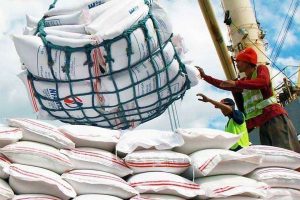THE Department of Agriculture (DA) warned legislators that raising rice tariffs to 35% from 15% too quickly could trigger price shocks, and advocated for a gradual increase instead.
At a committee hearing, Nueva Ecija Rep. Rosanna V. Vergara said: “I strongly urge the Secretary of Agriculture to reconsider reverting the tariff rates to the pre-existing rate of 35% and to review Executive Order No. 62, which had lowered the rate to 15%.”
“That might create a big shock in the market, and even to the world market,” Agriculture Secretary Francisco P. Tiu Laurel, Jr. said in response. “A gradual increase has been our suggestion.”
The hearing of the agriculture committee was exploring measures to curb food prices and bolster agriculture development, including restoring the National Food Authority’s (NFA) market regulatory powers.
The government in July 2024 slashed tariffs on rice imports to 15% from 35% until 2028 to tame rice prices. The rate is subject to review every four months.
“The last review, which was two months ago, our position with NEDA (National Economic and Development Authority) is to recommend a gradual increase towards attaining 35%,” Mr. Laurel said.
He said rates could be incrementally increased, by 10% first and then subsequent 5% hikes to slowly prime the rice market.
“It’s difficult if we raise it to that level immediately,” he said. “The price of rice will definitely increase suddenly.”
Meanwhile, the committee also recommended restoring the NFA’s regulatory powers, such as having the ability to intervene in the market to help keep rice affordable.
“(We) support the reinstatement of regulatory trade mandates of the NFA to enable market interventions, thereby stabilizing supply and prices of grains,” Albay Rep. Jose Ma. Clemente S. Salceda told the panel.
NFA Administrator Larry R. Lacson has said that he is seeking the restoration of the power to sell rice directly to the public to influence the market during times of high prices.
The DA is seeking an P18-billion budget to fund next year’s subsidized rice program, Mr. Laurel said.
He said the department has requested about P160 billion in funding for next year, with the bulk to be used to fund rice and livestock programs. — Kenneth Christiane L. Basilio

